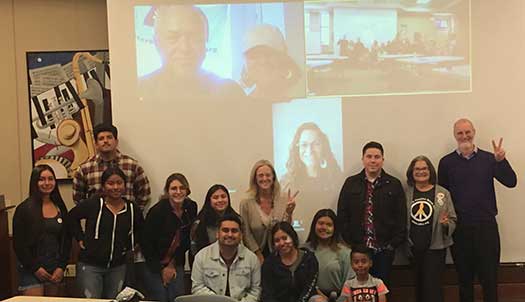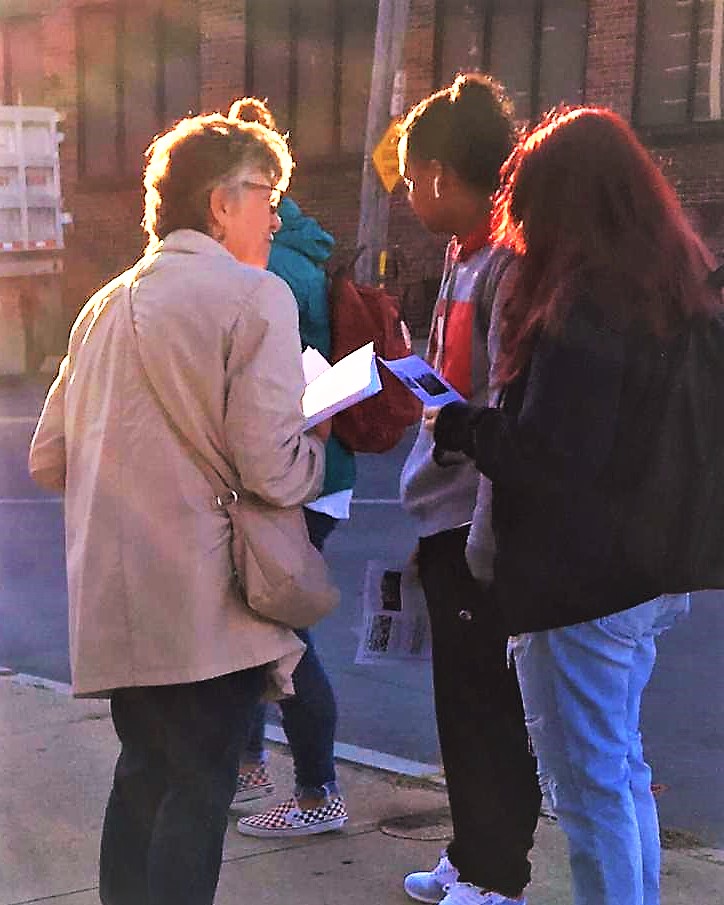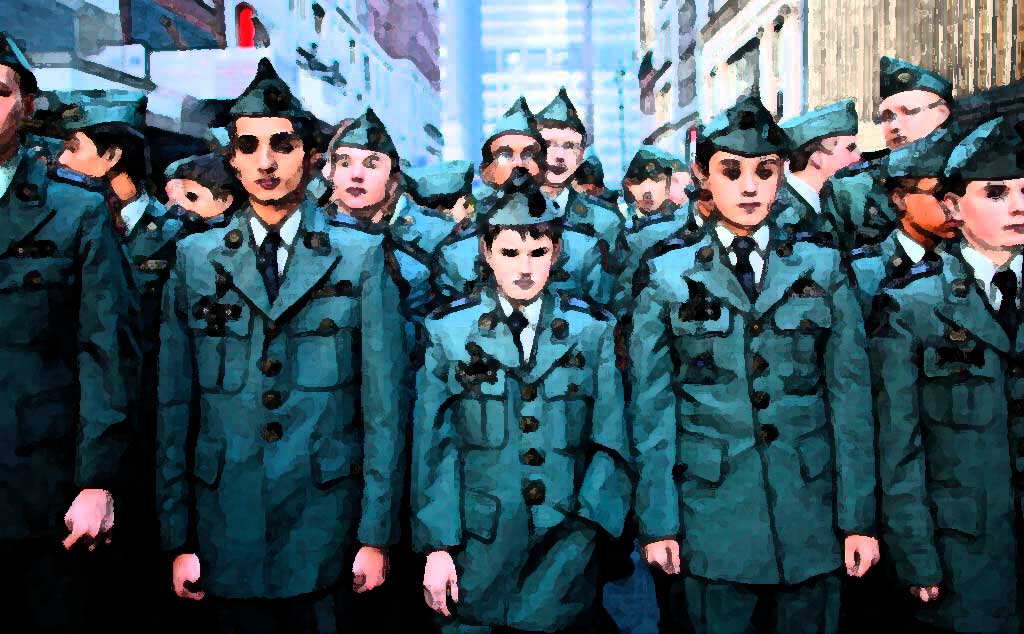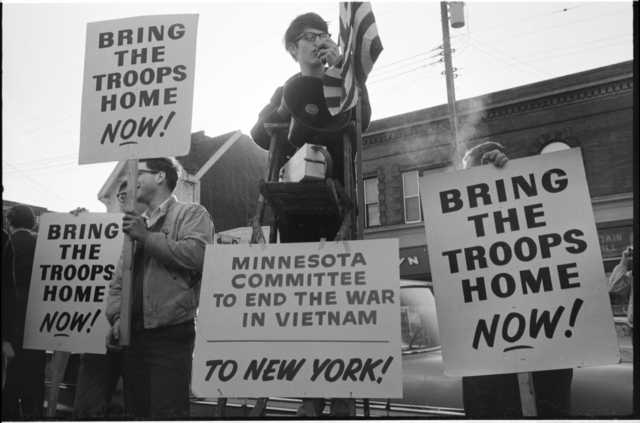Dear Friends of Truth in Recruitment, Thank you everyone who attended Truth in Recruitment's (TIR) Summit on Youth and the Military on October 12! It was a big success, and your participation means a lot to us. We hope that you gained more understanding of the Selective Service System, military recruitment in local schools, as well as the issues of deported veterans, and that you found the discussion helpful and informative.
Thank you everyone who attended Truth in Recruitment's (TIR) Summit on Youth and the Military on October 12! It was a big success, and your participation means a lot to us. We hope that you gained more understanding of the Selective Service System, military recruitment in local schools, as well as the issues of deported veterans, and that you found the discussion helpful and informative.
At a Santa Maria High School career fair this October, students reported that all branches of the military were represented but only community college Allan Hancock had a table. No four-year universities or colleges were present. With this in mind, please save the date to give public comment at the next Santa Maria Joint Union High School District school board meeting on Tuesday, November 12, 6:30-8pm. Through our organizing, we will advocate for a balance of information on students’ post-secondary options, and for the SMJUHSD to be more receptive to the community needs.
The National Network Opposing the Militarization of Youth (NNOMY)
 Bonnie J. Caracciolo, Chelsea Uniting Against the War (CUAW) - On September 9, 2019 members and supporters of Chelsea Uniting Against the War (CUAW) greeted students on their way to school. CUAW was there to inform students about their right to opt out from having their personal information given to military recruiters.
Bonnie J. Caracciolo, Chelsea Uniting Against the War (CUAW) - On September 9, 2019 members and supporters of Chelsea Uniting Against the War (CUAW) greeted students on their way to school. CUAW was there to inform students about their right to opt out from having their personal information given to military recruiters.
Since 2001 and the No Child Left Behind Act along with the 2002 National Defense Authorization Act- both which provided for the presence of military recruiters in middle- and high-schools - young people have become vulnerable targets.
The group distributed over 1000 leaflets describing the facts about military enlistment including information on homelessness among veterans along with other serious issues. One in ten homeless people in the US is a military veteran. (2019) Additionally, 150 opt out forms were handed out.
Chelsea High School is in a mostly immigrant, working-class neighborhood near Boston, MA. Current enrollment is 1,335 students in 9th through 12th grade.
Each of the activists spoke to several students who knew about the opt out forms and had already signed them.
How Rory Fanning went from Army Ranger to war resister (and counter-recruiter).
 Alex N. Press / Jacobin - In a high school classroom on the South Side of Chicago, Rory Fanning is telling students about the time he and his fellow Army Rangers occupied a school in Afghanistan. “We walked in and said, ‘School’s canceled, we’re going to use this as a military base for the next six weeks.’ There was nothing they could do about it.”
Alex N. Press / Jacobin - In a high school classroom on the South Side of Chicago, Rory Fanning is telling students about the time he and his fellow Army Rangers occupied a school in Afghanistan. “We walked in and said, ‘School’s canceled, we’re going to use this as a military base for the next six weeks.’ There was nothing they could do about it.”
Sometimes, after abducting locals for reasons as thin as not showing enough deference to soldiers, his superiors would place their detainees in separate classrooms and fire a gun somewhere out of sight so that each detainee would think the other had been shot. At that point, says Fanning, “We’d walk into the rooms where each person was and say, ‘Your friend didn’t tell us what we wanted to hear. Do you have anything we want to hear?’ This is how we got information. These are things I watched.”
It’s June 2019; the so-called War on Terror has been going on since before any of the students in the room were born. Fanning is presenting his story — how he went from volunteer enlistee to conscientious objector — to three classes this morning. He’s doing what’s known as “counter-recruitment.” The US military spends more than a billion dollars a year to draw enlistees to what has been, since 1973, an all-volunteer force. The gigantic institution employs around ten thousand recruiters, and thanks to the No Child Left Behind Act, they receive the same access to students as college recruiters. The odds are certainly not in Fanning’s favor.
Rather than finger-wagging to teenagers, telling them they cannot enlist, Fanning insists he simply wants them to know what they’re signing up for. After all, as he tells the class, the military is no regular job — if you try to quit, you can be sent to jail, or, at least historically, killed (“Your manager at Pizza Hut certainly doesn’t have that kind of power,” he says). His aim is to fill in the parts of the military experience that go unmentioned by recruiters — such as the fact that most of those killed in war are civilians, and that unlike Call of Duty, you can never turn off your memories of war.
The school we’re in has a particularly active Junior Reserve Officers’ Training Corps (JROTC) program, and men in uniform pass by in the hall between class periods as Fanning hangs back, talking with the teacher who invited him to speak today. The military emphasizes JROTC’s role in “character development” rather than as a recruiting vehicle, but almost half of JROTC cadets go on to enlist.
Fanning enlisted in the Army Rangers shortly after 9/11 — the Rangers were having a particularly good year thanks to Ridley Scott’s Black Hawk Down, a film depicting the regiment bloodletting in the Battle of Mogadishu. He had recently finished college and felt it wasn’t right that eighteen-year-olds, barely adults, were going to be the ones signing up to fight. Plus, he tells the class, he wanted to “prevent another 9/11.”
Despite Fanning’s desire to do good in the world — and maybe have his student debt paid off, too — it didn’t take long for him to come to a different view of the military. “I was expecting bullets to be whizzing by my head when I landed in Afghanistan,” he tells the students, “but when the sun came up the next day, all I saw was unbelievable amounts of poverty. I felt like a bully.”
 Jonah Walters, Jacobin - A smattering of information has been revealed about Connor Betts, the misogynist twenty-four-year-old who killed nine people and injured twenty-seven in Dayton earlier this month.
Jonah Walters, Jacobin - A smattering of information has been revealed about Connor Betts, the misogynist twenty-four-year-old who killed nine people and injured twenty-seven in Dayton earlier this month.
One of them was that he was in the Bellbrook High School Junior Reserve Officers’ Training Corps (JROTC) program, according to a classmate. We know little about Betts’s time in the program, the training he received, or what impact it had on him. But it’s worth mentioning that we have thousands of kids in America getting military training at school.
An estimated 500,000 high schoolers at 3,400 schools are enrolled in the JROTC, administered jointly by the military and each local school district. Students enrolled in JROTC classes are assigned ranks, taught military comportment and demeanor, and required to wear military uniforms. In most cases, students also receive training in military skills like marksmanship using school shooting ranges.
The Pentagon insists that JROTC is not a recruitment program, but a practical curriculum that teaches integrity and discipline — as innocuous as sports or physical education. But between 40 and 50 percent of students who complete three years of JROTC enlist in the military upon graduation, in part because JROTC graduates can receive enhanced pay and preferential benefits.
JROTC units are supervised by retired military officers who are exempt from civilian teaching certification requirements. To retain federal funding, each JROTC unit must maintain enrollment of 100 students or 10 percent of the student body — leaving the program vulnerable to organized student and parent boycotts.
This article posting dedicated to Libby Frank of the Northwest Suburban Peace & Education Project
Emilio, Educarueca.org - In the summer of 1963, the League of War Resisters created a peace action committee that fundamentally fought against the anti-terrorism terrorism exercised by the US-backed Ngo Dinh Diem government of South Vietnam. On July 25 there were pickets in the house of the permanent observer from South Vietnam to the UN, and in October, a demonstration to “welcome” Mrs. Ngo Dinh Nhu during her visit to New York.
THE FIRST NATIONAL SCALE PROTEST.
The first important demonstration against the war took place in New York on December 19, 1964, and was supported by the WRL, CNVA, FOR, the socialist party and SPU. One thousand five hundred people took to the streets despite a temperature below zero to hear the war denounced to Muste, Norman Thomas and. Philip Randolph. In San Francisco, one hundred people heard Joan Baez sing. Other demonstrations took place in Minneapolis, Miami, Austin, Sacramento, Philadelphia, Chicago, Washington, Boston and Cleveland. A feature of the mobilization was the disclosure of "a Call to American Consciousness," which prompted an immediate ceasefire and the earliest possible withdrawal of US troops.
 Elizabeth King, In These Times - Eighteen is the youngest age at which someone can join the U.S. military without their parents’ permission, yet the military markets itself to—which is to say recruits—children at much younger ages. This is in part accomplished by military recruiters who visit high schools around the country, recruiting children during career fairs and often setting up recruitment tables in cafeterias and hallways. As a result, most students in the U.S. will meet a military recruiter for the first time at just 17 years old, and children are getting exposed to military propaganda younger and younger.
Elizabeth King, In These Times - Eighteen is the youngest age at which someone can join the U.S. military without their parents’ permission, yet the military markets itself to—which is to say recruits—children at much younger ages. This is in part accomplished by military recruiters who visit high schools around the country, recruiting children during career fairs and often setting up recruitment tables in cafeterias and hallways. As a result, most students in the U.S. will meet a military recruiter for the first time at just 17 years old, and children are getting exposed to military propaganda younger and younger.
The recruitment of young people to the military is as old as the military itself, and has become more and more normalized along with the general militarization of schools. According to the Urban Institute, more than two-thirds of public high school students attend schools where there are “school resource officers,” a name for school-based police. This police presences comes on top of the role of military recruiters on campuses, or at college and career fairs.
Counter-recruitment surged in popularity during George W. Bush’s Iraq War, when the U.S. military ratcheted up recruitment for the war. But these days you don’t hear much about this movement, despite the fact that the U.S. is still engaged in brutal wars, from Yemen to Afghanistan, and the Trump administration has been threatening war with Iran. Out of the spotlight, dedicated counter-recruiters around the country are steadfast in their organizing to cut off the human supply chain to the U.S. military. U.S. wars have caused innumerable deaths, created long-term hardships in occupied nations, and cost trillions of dollars. Counter-recruitment, then, is about starving the military of the labor it needs to accomplish these destructive missions. When working with students, parents and school leadership, counter-recruiters focus on a variety of issues, including the negative personal consequences that come with being a soldier and broader problems like racism and U.S. imperialism.
 Elizabeth King, In These Times - Eighteen is the youngest age at which someone can join the U.S. military without their parents’ permission, yet the military markets itself to—which is to say recruits—children at much younger ages. This is in part accomplished by military recruiters who visit high schools around the country, recruiting children during career fairs and often setting up recruitment tables in cafeterias and hallways. As a result, most students in the U.S. will meet a military recruiter for the first time at just 17 years old, and children are getting exposed to military propaganda younger and younger.
Elizabeth King, In These Times - Eighteen is the youngest age at which someone can join the U.S. military without their parents’ permission, yet the military markets itself to—which is to say recruits—children at much younger ages. This is in part accomplished by military recruiters who visit high schools around the country, recruiting children during career fairs and often setting up recruitment tables in cafeterias and hallways. As a result, most students in the U.S. will meet a military recruiter for the first time at just 17 years old, and children are getting exposed to military propaganda younger and younger.
The recruitment of young people to the military is as old as the military itself, and has become more and more normalized along with the general militarization of schools. According to the Urban Institute, more than two-thirds of public high school students attend schools where there are “school resource officers,” a name for school-based police. This police presences comes on top of the role of military recruiters on campuses, or at college and career fairs.
Counter-recruitment surged in popularity during George W. Bush’s Iraq War, when the U.S. military ratcheted up recruitment for the war. But these days you don’t hear much about this movement, despite the fact that the U.S. is still engaged in brutal wars, from Yemen to Afghanistan, and the Trump administration has been threatening war with Iran. Out of the spotlight, dedicated counter-recruiters around the country are steadfast in their organizing to cut off the human supply chain to the U.S. military. U.S. wars have caused innumerable deaths, created long-term hardships in occupied nations, and cost trillions of dollars. Counter-recruitment, then, is about starving the military of the labor it needs to accomplish these destructive missions. When working with students, parents and school leadership, counter-recruiters focus on a variety of issues, including the negative personal consequences that come with being a soldier and broader problems like racism and U.S. imperialism.

